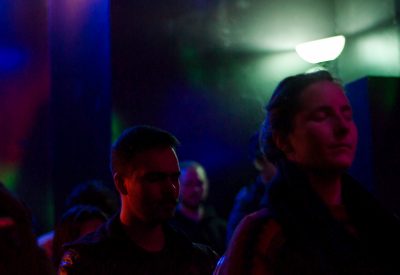In a room illuminated solely by colorful lights and music booming from a soundboard, attendees in a Heavy Meditation event were provided a unique space to relax in an unseemingly therapeutic way.

The Heavy Meditation event, hosted by the Brain Arts Organization at the Dorchester Art Project Saturday, heavily incorporated music into the practice in a model developed by Adam Tuttle, a licensed therapist and sound artist. The music is used to help people sit in silence and truly immerse themselves in the practice of meditating, Tuttle said.
“For me specifically, I started to develop [this model] for myself,” Tuttle said. “I find it very challenging to sit in silence… It’s hard to have a lot of active thoughts when the music is so loud and you can feel the pressure of the base.”
Tuttle said his interest in meditation and his drive to host an event on heavy meditation stemmed from his experience as a trauma therapist. When working with people who have anxiety or other forms of mental illnesses, Tuttle said he has witnessed the effectiveness that meditation provides his clients in controlling the mind and body.
“I have a trauma specialization so I’m drawn to working with trauma and chronic mental illness,” Tuttle said. “With that comes anxiety, panic attacks and I’ve seen grounding techniques in meditation to be very helpful in teaching you to regulate your body’s response to stimuli.”
Heavy music engages multiple senses through various sounds that people hear and experience during meditation, Tuttle said. He said this is a full body experience, which is not the case for some other therapeutic methods.
“It’s a full body experience, so it engages a lot of other senses that might not be engaged with other types of therapy,” Tuttle said. “The vibrations themselves evoke different feelings.”
Emma Leavitt, the creative and marketing director of the Brain Arts Organization, said she believes events like this are very important in today’s society because many people may not have the time or resources to properly get treated for mental illnesses, she said. Meditation gives people the ability to be in touch with their consciousness and control their thoughts, Leavitt said.
“We’re living in a really f—ed up society that doesn’t prioritize health and prevention,” Leavitt said. “I think meditation is a very empowering form of healthcare because it’s very focused on the singular individual, taking responsibility for their own thoughts and their own reality that they manifest through their consciousness.”
Leavitt said the Brain Arts Organization hopes to continue to host events like this because people in the community have been expressing a greater interest in activities relating to health. In the past, the organization has primarily focused on arts and music, but Leavitt said they are branching out to cater to the community’s desires.
“We’ve been solely focused on art since we’ve started our non-profit,” Leavitt said. “[But] since we’ve been in Dorchester, we’ve just noticed there’s a big appetite for healing or wellness activities.”
Sharon Cardamone, who teaches “Guided Yoga Meditation” for academic credit at Boston University’s Fitness & Recreation Center, wrote in an email that she believes there are many mental and physical benefits to practicing meditation.
“Some of the benefits of meditation that I experience myself and have also seen in my students,” Cardamone wrote, “are enhanced attention spans, more focus, more positive thinking, a feeling of contentment, more compassion, more of an altruistic attitude, better sleep, pain relief or reduced pain, a calmer mind and developing more creative solutions to problems, among others.”
It is important to offer meditation as a class at BU because it gives students an outlet away from their busy, technologically immersed lifestyles, Cardamone wrote. Hectic schedules and increased phone use creates higher stress and anxiety levels.
“People are pulled in so many directions because of the rapid advances in technology–the distraction of phones, texting, emails, social media, which can make the mind very scattered and anxious,” Cardamone wrote. “Meditation can provide a restful oasis from the modern busy-ness of life.”
Christopher Nehme, 29, of Somerville said he does not meditate on a daily basis but said he found his experience at the meditation event to be beneficial.
“As a fan of drone music, the event was already rewarding on a musical level,” Nehme said. “The opportunity to meditate as well was an added bonus for me.”

















































































































